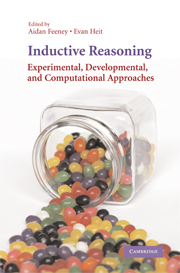Book contents
- Frontmatter
- Contents
- List of Figures
- List of Tables
- List of Contributors
- Preface
- 1 What Is Induction and Why Study It?
- 2 The Development of Inductive Reasoning
- 3 Interpreting Asymmetries of Projection in Children's Inductive Reasoning
- 4 Property Generalization as Causal Reasoning
- 5 Availability in Category-Based Induction
- 6 From Similarity to Chance
- 7 Theory-Based Bayesian Models of Inductive Reasoning
- 8 Use of Single or Multiple Categories in Category-Based Induction
- 9 Abductive Inference: From Philosophical Analysis to Neural Mechanisms
- 10 Mathematical Induction and Induction in Mathematics
- 11 Induction, Deduction, and Argument Strength in Human Reasoning and Argumentation
- 12 Individual Differences, Dual Processes, and Induction
- 13 Taxonomizing Induction
- Index
Preface
Published online by Cambridge University Press: 26 February 2010
- Frontmatter
- Contents
- List of Figures
- List of Tables
- List of Contributors
- Preface
- 1 What Is Induction and Why Study It?
- 2 The Development of Inductive Reasoning
- 3 Interpreting Asymmetries of Projection in Children's Inductive Reasoning
- 4 Property Generalization as Causal Reasoning
- 5 Availability in Category-Based Induction
- 6 From Similarity to Chance
- 7 Theory-Based Bayesian Models of Inductive Reasoning
- 8 Use of Single or Multiple Categories in Category-Based Induction
- 9 Abductive Inference: From Philosophical Analysis to Neural Mechanisms
- 10 Mathematical Induction and Induction in Mathematics
- 11 Induction, Deduction, and Argument Strength in Human Reasoning and Argumentation
- 12 Individual Differences, Dual Processes, and Induction
- 13 Taxonomizing Induction
- Index
Summary
Books on induction are rare; in fact, you are holding in your hands the first book devoted solely to the psychology of inductive reasoning in twenty years. And yet induction is a central topic in cognitive science, fundamental to learning, discovery, and prediction. We make inductive inferences every time we use what we already know to deal with novel situations. For example, wherever you found this book – in your university library, online, or in an academic bookshop – before picking it from the shelf or clicking on a link, you will have made some inductive inferences. Amongst other things, these inferences will have concerned the book's likely content given its title, its editors, its publisher, or its cover. Common to all of these inferences will have been the use of what you already know – about us, or the topic suggested by our title, or Cambridge University Press – to make predictions about the likely attributes of this book.
It is not only in publishers' catalogues that attention to induction has been scant. Despite its obvious centrality to an understanding of human cognition and behaviour, much less work has been carried out by psychologists on induction than on deduction, or logical reasoning. As a consequence, although there have been several edited collections of work on deduction and on decision making (Connolly, Arkes, & Hammond, 2000; Leighton & Sternberg, 2004; Gilovich, Griffin, & Kahneman, 2002; Manktelow & Chung, 2004), to the best of our knowledge there has never previously been an edited collection of papers on the psychology of inductive inference.
- Type
- Chapter
- Information
- Inductive ReasoningExperimental, Developmental, and Computational Approaches, pp. xiii - xxPublisher: Cambridge University PressPrint publication year: 2007

